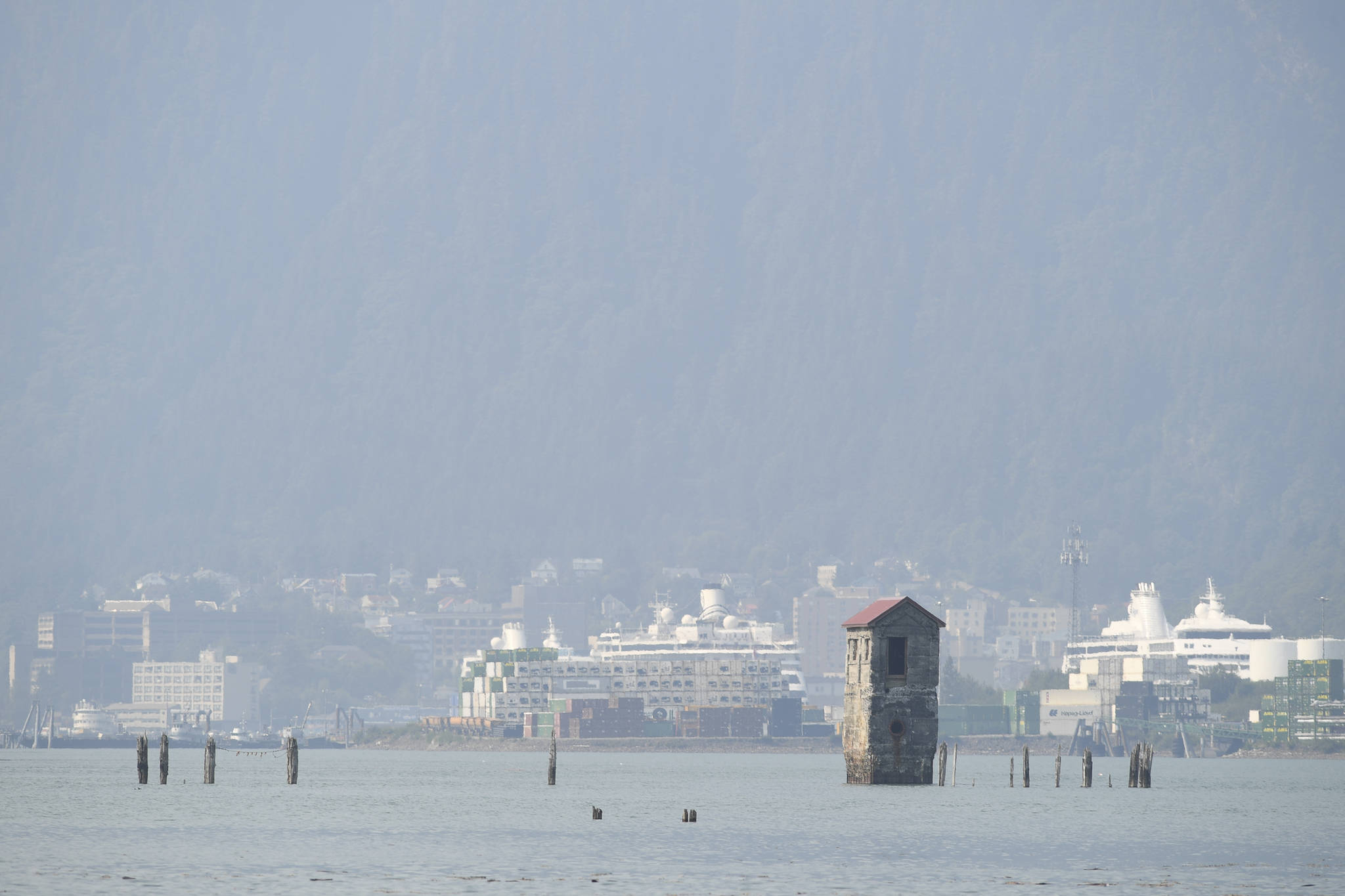Juneau’s warm spell — Monday marked the 15th consecutive 70-degree day, the longest-ever recorded streak in the capital city — has been marked with haze- and smoke-filled skies.
A mixture of haze and smoke is coming from wildfires burning in the Interior near Fairbanks and regions in northwest Canada, National Weather Service meteorologist Brian Bezenek said on Tuesday.
Bezenek said there’s a clockwise flow of air circulating around a high pressure area located in the northern Gulf of Alaska and southcentral Alaska. The air current moves up to Bristol Bay and the North Slope, over to the Interior and northwest Canada and finally down to Southeast.
Small particles of smoke from wildfires burning below is picked up by the air along the way.
“It’s just small particles being held aloft in the air,” Bezenek said of the smoke and haze. “It’s not heavy enough for the particles to fall back out due to gravity, so they’re just carried along sort of like a helium balloon.”
There are 117 active wildfires in the state, including seven new ones in the last 24 hours, said Deborah Coble, the fire communication and education specialist for the National Park Service’s Alaska Region.
“The wildfires are pretty much everywhere across the state except for the northwest portion,” Coble said.
The Hess Creek Fire, which began almost three weeks ago, was declared on Monday 2019’s largest fire to date in the United States.
More on that hot weather
The high temperature at the Juneau International Airport has fluctuated between 70 and 85 degrees between June 24 and Tuesday. Three new record high temperature days have been set in this two-week span: 81 degrees (June 27), 85 degrees (June 28) and 84 degrees (June 29).
When the 13th consecutive 70-degree-or-higher day hit town Saturday, it became one of just three other such stretches in Juneau’s recorded weather history. The last such stretch was last year from July 20-Aug. 1, according to NWS meteorologist Jake Ruckman.
Ruckman, who is from the Midwest and moved here from the East Coast four months ago, said the recent weather has caught him off-guard.
“I definitely did not expect to see this kind of conditions moving to a rainforest,” Ruckman said.
[How dry is our rainforest? Southeast’s rare drought could threaten plants, animals, your power bill]
It hasn’t just been Juneau that’s breaking weather records. Anchorage hit an all-time high temperature of 90 degrees on Independance Day, the same temperature recorded on Saturday on the Haines Highway.
Go away smoke
The weather on Tuesday was significantly more mild, with mostly cloudy skies and temperatures hovering around the mid-60s in the early afternoon. Bezenek said on Tuesday a change in wind direction should stop the flow of smoke to Juneau.
“The smoke isn’t going to be pushed into our area, it’s going to sort of be pushed out to sea over the Yakutat area and we’ll have a little bit less impact,” Bezenek said. “And then once that goes through, late next week it looks like we might have more of a significant weather change to bring in some precipitation.”
City issues air emergency
An air emergency was declared on Monday by the City & Borough of Juneau’s Lands Division and Capital City Fire/Rescue.
Open burn permits are cancelled and there is no open burning, according to a CBJ press release.
“The particulate levels are expected to remain unhealthy for the next few days,” the release states. “People with medical conditions or sensitivity to poor air quality should limit exposure and time outdoors. In general, people should limit outdoor aerobic activities until air quality improves.”
Contact the Lands Office at 586-5252 for more information. Contact CCFR at 586-0600 to report an open burn.
• Contact reporter Nolin Ainsworth at 523-2272 or nainsworth@juneauempire.com.

